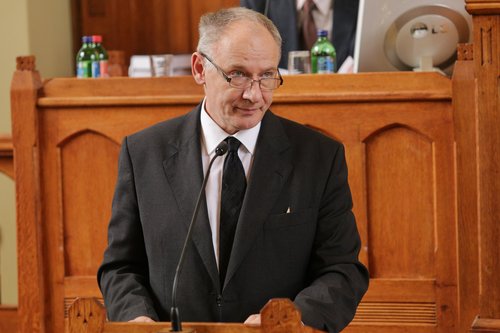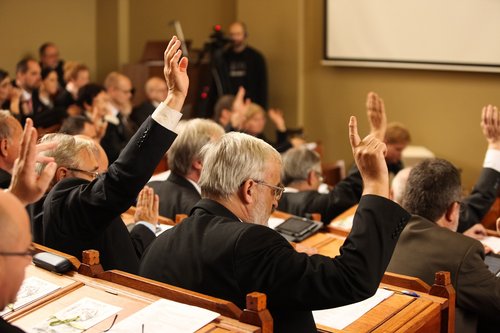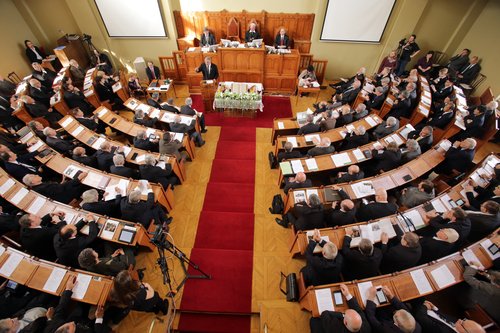Almost There
2015. április 21., keddWith the election of the Synod Legal Advisor and Chief Archivist, the new Synod, constituted on 25 February, is now almost complete. The election of the General Secretary has been postponed. Members of the Synod were assigned to standing Committees for the upcoming 6 years.
Bishop István Szabó, Ministerial President of the Synod emphasised in his opening speech that the main task of the Synod is to support pastors, teachers and communities of RCH who receive, represent and proclaim the transforming message of the Gospel. In this regard, he referred to the final report of the Church Revision Committee submitted to and received by the Synod last November. He would have put a larger emphasis on spirituality and vision, than the report does. Convincing people for the Gospel should be in the heart of the church life, whereas technical details of revisiting the church structure should play subordinate role.

The Synod has made a huge work in the past 25 years, said Bishop Szabó, but lost the right focus sometimes in concentrating too much on the re-establishing of church structures and legal frameworks. In consequence, the Church normally reacts to developments and challenges instead of being proactive. In times of communism the church had to content itself with the “freedom of reaction”. We shall change to freedom based on the liberating power of the Gospel, making the church sovereign as it represents God’s message in society and politics.
At the occasion of the 100th Anniversary of the Armenian Genocide, the Bishop recalled the persecution and martyrdom of Armenian Christians. We have to remind ourselves and others of the sufferance, Christians face still today, and give thanks that despite of all the hardships, we were allowed to spend the last 25 years in peace. -said the Bishop. We have to continue praying for all those who suffer persecution as there has always been Christians around the Globe who prayed for us in time of Communism. The Synod, subsequently, adopted a declaration on the memory of 100th Anniversary of the Armenian Genocide and the protection of the Christians suffering persecution in these days.
In this regard Bishop Szabó also expressed his gratitude to Hungarian-speaking Reformed member churches of the General Convent which in the last months offered reasonable support to the Reformed Church in Transcarpathia, Ukraine. He also gave thanks to the congregations for the trust in the new synod members and to the Synod for the trust in him.

Elections
An all-round renewal in terms of leading officers took place in the RCH in the last year. Presbytery (27) and District (4) councils and officers have been elected. The process culminated in the election of the Presidium of the new Synod on the 25th of February.
With the election of two of the three remaining members, the Synod of 100 members is now almost complete. Dr. Botond Gáborjáni Szabó, director of the College Library of the Transtibiscan Church District and Library of Theology has been elected as Chief Archivist. Dr. Lajos Veres, lawyer and member of the local church council of Piliscsaba bacame Legal Advisor to the Synod. In lack of a candidate, the election of the new General Secretary has been postponed until the next Synod meeting in November 2015. Meanwhile, based on the mandate of the Synod, the Presidium will appoint an interim to look after the tasks of the General Secretary.
General Secretary
The General Secretary or Principal Clerk is a voting member of the Synod. His or her role is to act as the Clerk to the General Synod, which includes advising the Synod and its Presidium on church law, practice and procedure, with the support of the Legal Advisor. Co-ordination of the work of the Church’s central administration is also part of the job. In addition to acting as secretary, he or she is also responsible for the implementation of its policies and decisions, and to manage the senior managers and departments as head of the Synod Office. This position is thus sort of a combination of the General Secretary as chief executive, and the Synod Clerk, coordinating and preparing the Synod meeting, that takes place twice a year.
Rev. Zoltán Tarr (43) finished his second term as General Secretary of RCH. He was successively elected to this position in 2003 and 2009. After finishing his studies in Budapest and Princeton, he served as university chaplain (1996 - 2001) and as associate pastor of the St. Columba Scottish Church in Budapest (2002 - 2005). He started his carrier in the Synod Office (Church House) of RCH as early as in 1996. He worked as ecumenical secretary subsequently was head of the youth department before being elected as head of the administration. He has a long record in the ecumenical and international arena. As a chief steward, he was responsible for the local coordination of the 1997 General Council of WARC in Debrecen. He was member of the Central Committee of the WCC from 1998 through 2005. Lately, he served on the Revision Working Group of CEC (2009-2013). He is married and father of 3 children.
Role of the Synod
According to the HRC’s constitution, the Synod of RCH is both the highest legislative body and the supreme executing body of the Church. The Presidium and the General Secretary are voting members of the Synod. The most important function of the body, according to the constitution, is to look into and determine the doctrines of the church. The Synod passes and adopts laws and regulations, determines the constitution, decides on the order of worship, and adopts the official translation of the Bible and the Hymn book to be used in the congregations. It also is responsible for setting principles for ministries and institutions supporting church life and its public representation and service. The Synod is entitled to establish and maintain public institutions in fields of education, healthcare, social care.

Composition of the Synod
The Synod members are elected for a six year term. The body consists of 100 members, including 20 officers who are ‘ex officio members. The remaining 80 commissioners are elected by congregational councils (kirk sessions) of each church district, taking into account the proportion of given numbers. Lay and ordained members are represented equally.
By right of their office, following are members of the Synod: Presidencies of the four church districts (Bishops and Lay Presidents) and their deputies, the protestant military Bishop or his deputy (depending on which of them is Reformed), the General Secretary, Legal Advisor, and the director of National Reformed Church Collections (Archives).
The number of commissioners by church district: Transtibiscan Reformed Church District (Debrecen) 26, Danubian Reformed Church District (Budapest) 24, Transdanubian Reformed Church District (Pápa) 12, and Cistibiscan Reformed Church District (Miskolc) 12.
In addition, academic institutions are represented by one elected members from each district, the healthcare institutions (delegation by the Dabubian District) and social institutions (delegation by the Transtibiscan District) have respectively 1 representative. Half of the representatives of the Presbyteries are pastors, half lay members. For each member a Proxy is elected. Deans and lay presidents of the Presbyteries and heads of departments of the Synod Office are non-voting members, eligible to attend the Synod meetings in an advisory capacity.
Business and representation: Committees, Synod Council, Presidency Council and Presidium
The Synod holds its meetings twice a year, in spring (May) and autumn (November). The Agenda is prepared by the General Secretary in agreement with the Presidium. The meetings are usually two days. Matters arise from the standing committees of the Synod, which are responsible for special fields of administration and church life. Committees are composed exclusively of Synod members, and work in an advisory capacity for decision making.
Committees of the Synod
Theology and Study Committee, Diaconal and Healthcare Committee, Finance Committee, Law and Church Polity Committee, Communication Committee, Foreign Affairs and Ecumenical Committee, Mission Committee, Pensions Institute Managing Committee, Education Committee, Audit Committee.
Between two sessions the Synod Council ensures the continuity of the work. The Council has the authority to take administrative decisions between Synods, co-ordinate the work of the Church’s central administration, and take decisions about legal matters, resources and finances. One of its most important tasks is to accept HRC's annual budget and approve the final accounts of public church institutions.
The Synod Council is headed by the Presidium, composed of the ministerial and lay president of the Synod (also Presiding Bishop and Chief Elder). “The Presidium of the Synod represents the Reformed Church in Hungary”. Among other things, this means that the Presidium is eligible and responsible for convening, chairing and setting the Agenda of the meetings of the Synod, Synod Council and the so called Presidency Council, a consultative body in advisory capacity to the Presidium, that includes Bishops and Lay Presidents of the four Church Districts, the General Secretary and the Legal Advisor to the Synod. The Presidium represents the Church in relations with the state, ecumenical and international partners, and in the public.
The sessions of the Synod are public according to the statute of the Church Constitution. Sessions are live streamed on the website of RCH.
Ecumenical Office
Contact us
Click here if you are interested in twinning.
Reformed Church in Hungary
Address: H-1146 Budapest, Abonyi utca 21.
PO Box: 1140 Budapest 70, Pf. 5
Email: oikumene@reformatus.hu
English, German and Korean language services in Budapest
Links
Recommended articles
-
Pastoral Letter in the Light of the Pandemic
Bishop Dr. István Szabó sent a pastoral letter of encouragement to the ministers serving in RCH’s congregations, expressing his gratitude for the persistence and creativity of the pastors.
-
RCH Joins in Pope's Call for Prayer
RCH published the call on congregations to join the initiative of Pope Francis, supported by ecumenical organisations, to unite in praying the Lord’s Prayer on Wednesday, 25 March, at noon.
-
English Speaking Worship Services Online
Each Sunday at 11 AM (CET) the St. Columba's Church of Scotland in Budapest, the international community of RCH invites you to join the worpship service on its facebook page.
-
Test of Humanity and Companionship
Reformatus.hu asked Dr. György Velkey, Director General of the Bethesda Children’s Hospital of RCH about the challenges of health care workers and ways of prevention against the pandemic.
-
All Church Events Suspended
In light of the coronavirus the Presidium of RCH requested congregations to suspend all church events with immediate effect. Beside restrictions, it calls for prayer, sobriety and responsibility.











